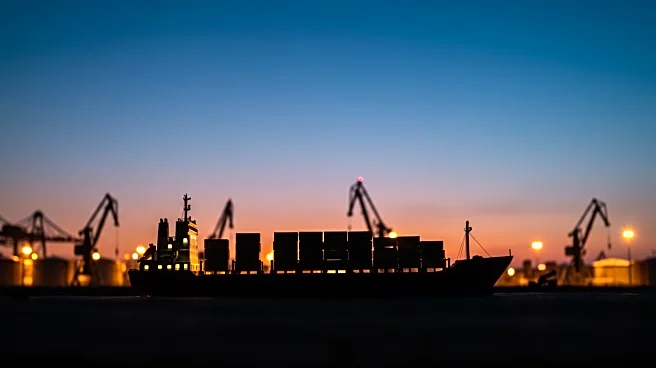What is the story about?
What's Happening?
The United Arab Emirates' port of Fujairah experienced a significant rebound in marine bunker fuel sales in July, reaching the highest levels in three months. According to data from the Fujairah Oil Industry Zone, sales totaled 640,715 cubic meters, marking a 13.8% increase from June. This surge was primarily driven by high-sulphur marine fuel sales, which rose by 28.4% to 205,597 cubic meters. The increase in high-sulphur fuel sales is attributed to a wider price difference between low-sulphur and high-sulphur fuel oils, with the premium for low-sulphur fuel hitting a six-month high of over $95 a ton in mid-July. Low-sulphur marine fuel sales also saw an 8.0% rise, totaling 435,118 cubic meters. The market share for high-sulphur bunkers expanded to 32%, while low-sulphur bunkers decreased to 68%.
Why It's Important?
The increase in marine fuel sales at Fujairah port is significant for the global shipping industry, as it affects fuel costs and operational expenses for shipping companies. The shift towards high-sulphur fuel, driven by price differentials, could influence environmental policies and fuel regulations, given the higher emissions associated with high-sulphur fuels. Shipping companies may face increased costs if the trend continues, impacting freight rates and potentially leading to higher consumer prices for goods transported by sea. The dynamics of fuel pricing and sales at Fujairah could also affect global supply chains, as companies adjust their fuel procurement strategies.
What's Next?
If the price differential between low-sulphur and high-sulphur fuels persists, shipping companies might continue to favor high-sulphur options, potentially prompting regulatory scrutiny and environmental concerns. Stakeholders in the shipping industry, including regulatory bodies and environmental groups, may push for stricter emissions standards or incentives for cleaner fuel usage. Additionally, fluctuations in fuel sales and pricing at Fujairah could influence global shipping routes and fuel procurement strategies, as companies seek cost-effective solutions.
Beyond the Headlines
The shift in fuel sales at Fujairah port highlights broader challenges in balancing economic and environmental priorities within the shipping industry. As high-sulphur fuel sales rise, there may be increased pressure on international regulatory bodies to enforce stricter emissions standards, potentially leading to technological innovations in cleaner fuel alternatives. The situation underscores the complex interplay between market forces and environmental sustainability in global trade.


















